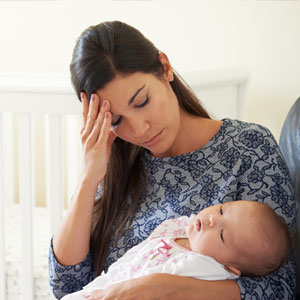Just two days after bringing my glowing baby girl home from the hospital, postpartum depression (PPD) hit me like a tornado. It sucked me into a dizzying blur of insomnia, unrelenting anxiety, and inexplicable crying. Must be the “baby blues,” I told myself… until months later, shaking in extreme exhaustion, I was rushed to the psychiatrist’s office. That wasn’t how I planned on kicking off motherhood, but the good news is this doesn’t have to happen to you!
PPD vs. the blues
The “baby blues” is a normal hormonal adjustment period that lasts no longer than two weeks. “With PPD, we’re talking about a mom’s ability to function on a daily basis beyond the first two weeks,” says Katherine Stone, founder and author of Postpartum Progress, the most widely read blog about PPD. “She may have serious trouble eating and sleeping, cry for no reason, experience deep sadness, and is likely to feel completely overwhelmed and think she never should have become a mother,” Stone explains. To boot, PPD can creep up any time within the first year of giving birth.
“But PPD and postpartum anxiety are not one-size-fits-all illnesses,” Stone says. “Others may experience irritability and anger, obsessive worrying, or feeling disconnected from the baby.” In fact, though there are risk factors, there’s no single recipe for PPD, either; it can affect any new mother.
The syndrome crops up because of many different issues that, when swirled together, create the perfect storm. Hormonal changes, sleep deprivation, difficult family relationships, stress, isolation, a high-needs baby—any of these can tip a woman’s balance.
What you need to know now
What pregnant woman wants to think the post-birth period could be anything but beautiful? But the truth is, when PPD hits, you’re already caring for a newborn, barely lucid, and teetering through hazy days (and nights), making it harder to differentiate between normal worrying and debilitating anxiety. “That’s why it’s important for pregnant women to be aware of the symptoms before the baby arrives,” says Ceres Rutan, Psy.D, an expert in postpartum adjustment. “The sooner it’s diagnosed, the less extreme it can be, and the recovery is faster.”
Stone adds, “One of the best things a mom-to-be can do is to be openly aware of who she truly is and share any concerns with her partner and physician during her pregnancy. That way, everyone is prepared to help should PPD arise.”
Know the risk factors
Studies show that women are at a higher risk of developing PPD or anxiety if they have:
- a previous history of depression, anxiety, or bipolar disorder
- a family history of postpartum illness
- any form of diabetes
- a type-A personality or tend to be a perfectionist
- delivered multiples gone though a recent major stressor, like a house move, job loss, divorce, or loss of a loved one,
- or experienced a traumatic childhood
- inadequate social support
- difficulty conceiving,
- traumatic delivery, or unexpected birth complications
- premenstrual dysphoric disorder (PMDD)
— Susan C. Kim is a writer and mother who suffered postpartum anxiety herself. A former editor at Coastal Living, she has also written for Time magazine.
